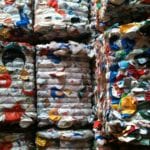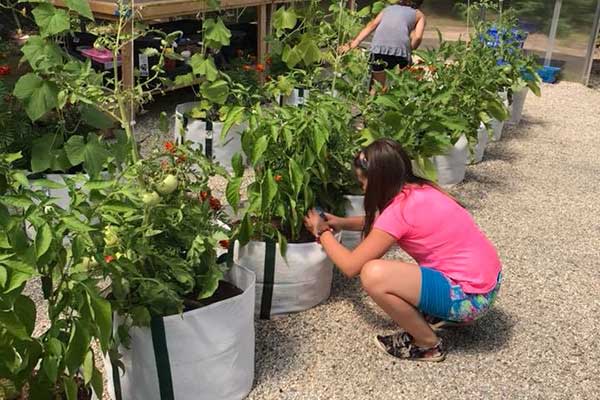Maine’s clean and healthy environment strengthens the state’s economy and is central to our way of life. Holding polluting corporations accountable through systemic changes in local, state, and federal policies is the key to creating a more healthy, prosperous, sustainable future for us all.
NRCM’s Sustainable Maine program takes a practical, collaborative approach to solving environmental problems faced by Maine people and communities, particularly with how to better prevent and manage waste. We want to make doing the right thing for people and the environment the easy, clear choice for individuals and businesses.
Our vision of sustainability in Maine is ensuring a healthy future for life on Earth. Unfortunately, polluting corporations continue to ignore what is right for the environment at the expense of people’s health. Instead, they spend big money to try to convince people that it’s an individual’s responsibility to act, not theirs. But we are onto them.
The fossil fuel industry knows our clean energy transition is underway, so to keep their profits flowing, they are ramping up production of single-use plastics. We cannot allow this to happen. At every stage of the life cycle for plastics — from production to disposal — there are significant human health impacts, and they disproportionately affect economically and socially disadvantaged people.
Many of us feel guilty that we still rely on gasoline-powered cars, and we can’t seem to avoid wasteful packaging despite our best efforts—but it’s not our fault as individuals. In the State House, in schools, and in our communities, NRCM works with local businesses, municipalities, and Maine people to galvanize support for solutions that require corporations be a part of solving the problem and make it easier to reduce waste and pollution.
Learn more about our Sustainable Maine program priorities and how you can help on the pages below.

Contamination of Maine Lobster Shows Value of Regulations
Kennebec Journal editorial The lobster fishery has been the one bright spot in Maine’s seafood industry for years — at least until last week. On Feb. 18, the state Department of Marine Resources ordered a two-year shutdown of lobster and crab harvesting in a 7-square-mile region at the mouth of the Penobscot River. Mercury contamination Read More

Support of LD 1634, An Act To Allow an Earlier Implementation Date for an Architectural Paint Stewardship Program
Senator Boyle, Representative Welsh, and members of the Joint Standing Committee on Environment and Natural Resources. My name is Sarah Lakeman. I am the Sustainable Maine Policy Advocate for the Natural Resources Council of Maine and I appreciate this opportunity to testify in Support of LD 1634. NRCM was involved in shaping and passing LD Read More

Maine Enacts Law to Create New Paint Recycling Program
NRCM press release (Augusta, ME) – Maine is set to become the seventh state in the country with a law creating an industry-run collection and recycling program for leftover household paint. The law will provide Maine residents with a safe, convenient, and environmentally responsible way to dispose of their leftover latex and oil paint, while Read More

Maine Lawmakers Pass Bill to Create Paint Recycling Program
Has Broad Support from Paint Industry, Towns, Environmental Groups, and Retail Stores NRCM and PSI press release (Augusta, ME)—With strong bipartisan support, the Maine Legislature today enacted a bill to create an industry-run collection and recycling program for leftover household paint. If allowed to become law by Governor Paul LePage, the bill (LD 1308) would Read More

Support of LD 1308, An Act to Establish a Stewardship Program for Architectural Paint
Good afternoon Senator Boyle, Representative Welsh, and distinguished members of the Joint Committee on Environment and Natural Resources. My name is Abby King, I am the Toxics Policy Advocate with the Natural Resources Council of Maine and I am here to testify in support of LD 1308. This bill provides a proven solution to the Read More

Support of LD 1335, An Act to Implement Recommendations of DEP Concerning Product Stewardship
Good afternoon Senator Boyle, Representative Welsh, and distinguished members of the Joint Committee on Environment and Natural Resources. My name is Abby King; I am the Toxics Policy Advocate with the Natural Resources Council of Maine. NRCM strongly supported the product stewardship framework bill approved by the Legislature and enacted into law in 2010, and Read More

Leftover Paint Waste Target of Maine Bill
Maine Public news story More than 70 million gallons of discarded household paint wind up in the nation’s landfills each year, and untold gallons more remain stored away in attics, basements and garages in sticky, dented containers. About 10 percent of all paint sold is wasted, and many homeowners don’t know what to do with Read More

Support of LD 902, Resolve, Regarding Legislative Review of Portions of Chapter 882: Designation of BPA as a Priority Chemical
Senator Boyle, Representative Welsh, and Members of the Joint Select Committee on Environment and Natural Resources. My name is Abby King and I am the Toxics Policy Advocate with the Natural Resources Council of Maine. I am a resident of Brunswick. I am here to testify in support of LD 902. These rules are before Read More

New Report Reveals Success of Product Stewardship in Maine
Payments for Recycled Thermostats Make Maine a Leading State Program NRCM Press Release A new report released today by the Natural Resources Council of Maine, Multi-state Mercury Products Campaign (MMPC), and Product Stewardship Institute, shows that Maine’s manufacturer-run program for collecting mercury thermostats is keeping the toxic heavy metal out of the trash and the Read More














